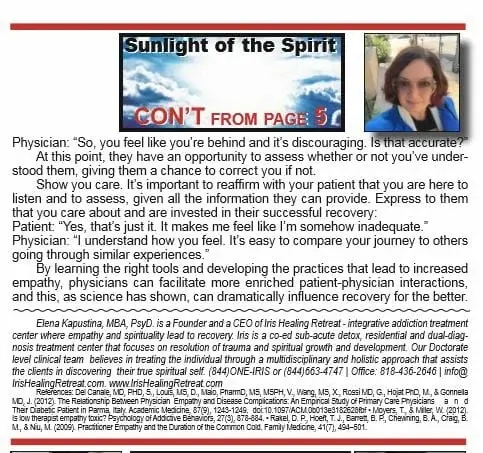
But what exactly is empathy? When it comes to recovery from a difficult injury, illness, or addiction, how big of a role does it truly play? Most people agree that appropriate treatment for recovering addicts can include counseling, pharmaceuticals, and perhaps certain mindfulness practices.
Many people find lasting success when each of these are combined in a personal-ized way with additional emphasis on group therapy.
Maybe the reason support groups like Alcoholics Anonymous see so much success is because of the environment of empathy they provide. Participants can sense that others deeply care about what they’re going through, that others genuinely feel (or have felt) what they’re feeling. Perhaps if physicians actively expressed empathy to their patients, they could increase the effectiveness of their treatment regimens.
The Science of Empathy
Scores of studies seem to support the idea that rigorous training in empathy should be integrated into medical curriculum.
In one recent study of nearly 21,000 people with Type I or Type II diabetes, researchers found that physicians expressing more empathy toward patients seemed to have a positive effect on clinical outcomes.
Another study’s objective was “to assess the relationship of empathy in Medi-cal office visits to subsequent outcomes of the common cold.” Cold severity was measured twice daily, while empathy was scored by each patient through a Consultation and Relational Empathy (CARE) questionnaire.
The prompts asked them to rate interactions with their physician based on criteria like perceived involvement and investment in their care, and whether they felt their doctors had an authentic interest in their treatment and well-being. The results found that “clinician empathy…significantly predicts subsequent duration and severity of illness, and is associated with immune system changes.”
Empathy and Addiction
It makes sense that a counselor providing treatment has one of the largest impacts on the recovery of someone suffering from addiction, but a 2012 study emphasizes that “the therapeutic skill of accurate empathy… has been found to account for a meaningful proportion of variance in addiction treatment outcomes.”
Those therapists exhibiting a high level of empathy appear to be more successful, while those preferring confrontational counseling, thus ex-pressing less empathy, are “associated with higher dropout and relapse rates, weaker therapeutic alliance, and less client change.”
How to Strengthen Emphatic Skills
So, until the curriculum catches up to this mounting evidence for the power of physician empathy in recovery, how does a medical professional (or anyone who’s interested) improve emphatic skills? Luckily, capacity for empathy can usually be developed and honed.
Practice active listening. Many physicians have a tendency to ignore a patient’s insistence on certain symptoms and anxieties, dismissing them as either fear or biased assumptions.
By listening to and doing their best to analyze patient experiences, doctors can learn a lot that physical measurements of health can miss.
Use verbal affirmations. This is a great way to give a patient your full attention and presence. Affirmations go a long way to improving your understanding, retention of information, and make a patient feel more comfortable and acknowledged, which in turn can reduce stress.
One way to practice affirmations is to repeat a patient’s statement back to them, but paraphrased. An example exchange could look like this:Patient: “I feel like others are making more progress than me, and it’s really been bothering me lately.”
Physician: “So, you feel like you’re behind and it’s discouraging.” This accomplishes a couple of things.
First, it forces you to really digest what they’ve told you, making you more likely to understand and remember it.
Second, it ensures the patient that you were listening.
This brings us to our third way to improve emphatic skills – Ask for confirmation.
After you paraphrase the patient’s statement, ask if you got it right. Continuing with the above example conversation:
Physician: “So, you feel like you’re behind and it’s discouraging. Is that accurate?”
At this point, they have an opportunity to assess whether or not you’ve understood them, giving them a chance to correct you if not. Show you care.
It’s important to reaffirm with your patient that you are here to listen and to assess, given all the information they can provide.
Express to them that you care about and are invested in their successful recovery.
Patient: “Yes, that’s just it. It makes me feel like I’m somehow inadequate.”
Physician: “I understand how you feel. It’s easy to compare your journey to others going through similar experiences.”
By learning the right tools and developing the practices that lead to increased empathy, physicians can facilitate more enriched patient-physician interactions, and this, as science has shown, can dramatically influence recovery for the better.


